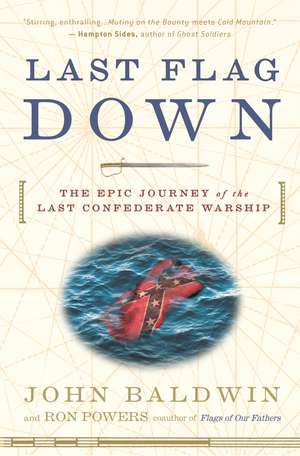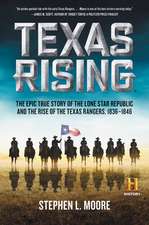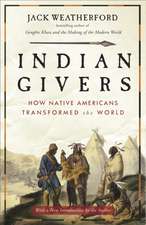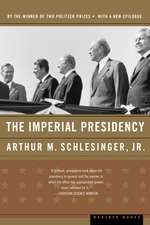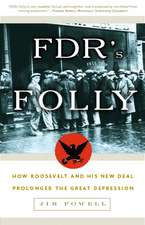Last Flag Down: The Epic Journey of the Last Confederate Warship
Autor Ron Powers, John Baldwinen Limba Engleză Paperback – 30 apr 2008
Then, in August of 1865, a British ship revealed the shocking truth to the men of Shenandoah: The war had been over for months, and they were now being hunted as pirates.
What ensued was an incredible 15,000-mile journey to the one place the crew hoped to find sanctuary, only to discover that their fate would depend on how they answered a single question. Wondrously evocative and filled with drama and poignancy, Last Flag Down is a riveting story of courage, nobility, and rare comradeship forged in the quest to achieve the impossible.
From the Hardcover edition.
Preț: 113.38 lei
Nou
Puncte Express: 170
Preț estimativ în valută:
21.70€ • 22.46$ • 18.34£
21.70€ • 22.46$ • 18.34£
Carte disponibilă
Livrare economică 12-26 februarie
Preluare comenzi: 021 569.72.76
Specificații
ISBN-13: 9780307236562
ISBN-10: 0307236560
Pagini: 354
Ilustrații: 3 MAPS
Dimensiuni: 134 x 204 x 20 mm
Greutate: 0.27 kg
Ediția:Reprint
Editura: Three Rivers Press (CA)
ISBN-10: 0307236560
Pagini: 354
Ilustrații: 3 MAPS
Dimensiuni: 134 x 204 x 20 mm
Greutate: 0.27 kg
Ediția:Reprint
Editura: Three Rivers Press (CA)
Notă biografică
John Baldwin, a relative of Conway Whittle, is a magazine writer, lecturer, and the author of two novels. At seventeen, Baldwin was apprenticed to the ship’s carpenter on a merchant vessel sailing the ports of Africa.
Ron Powers, a Pulitzer Prize winner, is the author or coauthor of twelve previous books, among them the number one bestseller Flags of Our Fathers and the acclaimed biography Mark Twain, a finalist for the 2005 National Book Critics Circle Award.
From the Hardcover edition.
Ron Powers, a Pulitzer Prize winner, is the author or coauthor of twelve previous books, among them the number one bestseller Flags of Our Fathers and the acclaimed biography Mark Twain, a finalist for the 2005 National Book Critics Circle Award.
From the Hardcover edition.
Extras
1
Coal.
The Noble Cause bleeding to death, starving to death. The Northern aggressors with their dirty heels in the sacred ground of Louisiana, Georgia, Virginia; his generation largely in its graves, or soon to be. And here he was watching the empty horizon from a coal-laden merchant steamer off the coast of West Africa. Three decks below him, his crew bent to dismal duty, the drudgework of the high seas. They were securing the ship’s bunker coal—her fuel supply—and preparing her cargo, of yet more coal, for heavy weather. The description given to those sweating wretches who had to carry it out said it all: “coal heavers.”
Coal.
A mundane cargo for this fine fast ship running now in front of the wind, racing for her life, almost due south, and almost diametrically away from the Confederate States of America. Within her, a cargo weighing almost as much as the ship itself and a valuable cargo indeed: 800 long tons of almost smokeless Welsh coal. A cargo so expensive its owners had sent a man on the voyage to look after it, to see it wasn’t pilfered for fuel, to see it was delivered as planned. A cargo almost as mundane as the young “coal agent’s” undercover alias: “George Brown.”
To be hauling coal, not Enfields, at this moment of the Confederacy’s most parlous plight: Atlanta, proud citadel of the Confederacy, lost to Sherman; Lee in the trenches at Richmond since June; Sheridan’s cavalry chasing Jubal Early’s ragged men up the Shenandoah Valley, burning the fields and barns and mills behind them.
Norfolk, Virginia, or those remnants that had not been burned, was now under martial law; indeed, the homes of “Brown’s” family, the Whittles, the Sinclairs, the Pages, those still standing, were occupied by Federal troops. The South that the young man had known as a glittering nation unto itself, a kingdom of honor and deep traditions, where family names reached back in time until they seemed to merge with the land itself—this Old South was now a scorched, bleeding thing, its armies ground up by the cold advancing Union machine. The war was in its brutal, inexorable end-game.
Sea King, since leaving London days ago, seemingly irrelevant to it all, had plodded toward the southern seas with a consignment of coal. Simply a modern merchantman going peacefully about its business.
Or so the slim boyish “George Brown—coal agent” had hoped any dangerous adversary in the vicinity of the London docks would believe— falsely. When he left the Thames on Sea King, he had staked his life, the life of a Confederate spy, on that risk. Any hostile interception, any “search and seizure” of that vessel and her stores, would have guaranteed his imprisonment, even death. But Sea King was gone now, reported lost, in reality sold to the Confederacy, renamed and reflagged.
“George Brown” had, for the first eleven days, risked only his own life, but now there were others, a new crew, and soon he would be risking these men’s lives as well. Any hostile interception of this once-peaceful vessel now would be an act of war.
And war was his profession.
He was in fact an experienced and dangerous warrior of the sea: Lt. William Conway Whittle, CSN. And this risk was only the first in a Homeric voyage that promised more, and ever more terrible, risks.
What a busy day these twenty-four hours have been. Thank God we have a fine set of men and officers, and, although we have an immense deal to contend with, we are industrious and alive to the emergency.
Just the sort of mild pleasantries (aside from that “emergency”) one might expect from the mind of a slightly built twenty-four-year-old with narrow, sloping shoulders; a high, almost scholarly forehead crowned by a severely combed pompadour; narrow-set, vaguely disapproving eyes; and a small mouth that gave no hint of the eloquent mind inside. He could have been a schoolmaster or an assistant bank clerk. But on this day—October 26, 1864—young Lieutenant Whittle commenced the log of an odyssey that would take its place among the most evocative testimonials produced by the Civil War.
Sea King’s cargo of coal had been a ruse. The emergency was real. The coal had been the final camouflage in a desperate, nonesuch skein of conspiracy conceived and carried out over many months by Whittle and senior agents of the Confederacy working discreetly in London and Paris late in the Civil War: a scheme to obtain this speedster of a ship—this Sea King—from the English merchant navy with the quiet consent of Queen Victoria herself; load up a cargo of the black, fumy stuff; and, keeping her disguised as a harmless freighter, ease her out of the harbor at London, down the Thames into the English Channel, and from there toward her destiny as a killer of Yankee vessels. She would be met by her Rebel crew and her supply of armaments somewhere on the open ocean, far from the prying eyes of Yankee spies. Sea King’s cover story was virtually airtight. There was only one tie to the Confederacy when she finally left England, in fact there was only one Rebel on board at all, and he was undercover: Lt. William Conway Whittle, CSN, also known as “Mr. Brown.”
Conway Whittle was an ideal figure for this mission. But for his youth and paucity of experience as a commanding officer, he might well have been tapped to command the raider. As it was, he’d been personally selected by top Confederate operatives in Europe to be the ship’s executive officer, second in rank only to the captain. On the heels of his dashing exploits as a blockade runner, Whittle had been secretly summoned to Paris in September 1864. There he met with Commodore Samuel Barron, a lifelong friend of Whittle’s father, Commodore W. C. Whittle, and one of young Lieutenant Whittle’s primary mentors. Commodore Barron was also one of the key figures in the Confederacy’s hopes to patch together a navy from a European base. Barron handed young Whittle a letter that contained his instructions. He was to make his way via Liverpool to London and check into the fashionable Wood’s Hotel under the “Brown” alias. On the Friday morning of October 7, carrying a newspaper and dressed in unobtrusive business attire, the young man was to take a seat in the hotel dining room, pull the corner of his napkin through a buttonhole in his jacket, and await a stranger who would ask him, “Is this Mr. Brown?”
This figure would be Richard Wright, an elderly Liverpool businessman who’d become wealthy through his investments in Southern cotton. It was Wright who had discreetly purchased the ship then known as Sea King and was in London to arrange its transfer to the Confederate Navy. After the Wood’s Hotel rendezvous, Wright took “Brown” toward the East India Dock, so that the younger man could get a covert glimpse of the exquisitely built black, three-masted extreme clipper he would board before dawn the next day. Then, in his final act as the ship’s owner, Wright took Whittle to a safe house where he introduced him to Capt. Peter S. Corbett, Sea King’s interim captain, and formally gave Corbett power of attorney to sell the ship at any time, to any suitable offer. As all three knew, it was an offer already accepted.
At 3:00 a.m. on Sunday, October 8, “Brown” performed the final act in the elaborate ruse concocted for him. He checked out of the hotel and headed for the waterfront, stumbling and reeling like a drunken man. At the dock, he gazed upward at Sea King’s bowsprit, then pretended to steady himself for what would appear to be any old besotted sailor’s last-minute return on board after a night of AWOL pub- crawling. No one moved to stop him. Still, rather than risk the conspicuous gangway, he crawled over Sea King’s low-slung hull near the forerigging. Within moments the ship cast off and began to idle her way down the Thames—the first small leg of a voyage that would take her around the world.
Sea King’s slow passage toward the Atlantic was excruciatingly hazardous, a gauntlet that could doom her at any moment. Both Yankee and Rebel spies (and counterspies) prowled the docks at London and Liverpool, the eyes and ears of both the embattled governments across the sea. From the first days of secession, the officially neutral Great Britain had been frantically courted by American diplomats from both the North and the South. Even at this late stage, her two great shipyards held the potential to turn the war one way or the other. Thus, hardly any ship moved in and out of either port city without scrutiny and rapidly relayed comment.
The Confederacy needed Britain far more than the Union did. Southern strategists dreamed of giant ironclads and took steps to have them built at Liverpool; ironclads that could steam west across the Atlantic, smash the Union blockade, reestablish the cotton trade with Britain, and even perhaps move up the Atlantic coast and the inland waterways, shelling Northern cities as cannonballs bounced helplessly off their plated sides. British merchants, long since grown fat on the slave-harvested Dixie cotton spun into textiles in their mills, heavily favored an economic/military alliance with the South.
The industrial Union, by contrast, competed with England for the South’s raw materials, had little to offer England in the way of lucrative trade, and in fact suffered British ill will that still lingered from the unpleasantness involving General Cornwallis, Yorktown, and the Declaration of Independence. And then of course the War of 1812. Lord Palmerston, the head of the British government, could hardly hear the words “American democracy” without harrumphing.
Thus a British-Confederate alliance, in the war’s early weeks and months, seemed to need just the formalizing strokes of a few pens. The inevitability was delayed only by American diplomacy and American intelligence.
But what diplomacy! And what intelligence! Holding the fabric of British neutrality together virtually with their bare hands were a determined duo of American diplomats as brilliant, tough, resourceful, and utterly inexhaustible as they were different from each other. They arrived separately in Great Britain in 1861, each appointed by Abraham Lincoln. One of them, a bearded, jug-eared Quaker from New Jersey, set up a vast and intricate network of information agents from his Liverpool office as American consul. He fed the results—munitions transactions, secret and illicit shipbuilding agreements, blockade-running plans—to his “odd-couple” colleague at the Court of St. James in London: a cold, aloof patrician from America’s most distinguished family who held the lofty ambassadorial title Envoy Extraordinary and Minister Plenipotentiary. The ambassador in turn used this information to forestall the dreaded alliance: he mounted eloquent arguments to Parliament that Britain was violating its own legal standards of neutrality, and demanded that Her Majesty’s government uphold its sacred ideals.
Their names were Thomas H. Dudley and Charles Francis Adams. It was their combined power—the power of the United States itself, in the end —that young Lt. William Conway Whittle would soon
find himself matched against in a desperate cat-and-mouse game that would span the globe.
In fact, Thomas Dudley had already got wind of Sea King. Before she was moved to London, the United States consul in Liverpool had received a tip from a detective regarding a suspiciously sleek- looking craft docked on the Mersey. Dudley took a look for himself, and notified Charles Adams in London that he was keeping an eye on a likely privateer. But Dudley was lulled by subterfuge, and waited too long to act. The ship’s operatives, wary of just such attention, allowed Sea King to saunter in and out of various ports on the English coast, like a merchantman searching for a cargo, until the consul’s suspicion waned. None of the crew had an inkling of the ship’s true purpose; they were professional British sailors who had signed on to what they’d been told was a straightforward commercial voyage: London to Bombay and back, a fine payday on a fine new ship. And so even though Sea King had left London without interference, she had not sailed with indifference.
Enemy spyglasses had followed her as she made her way along the Thames in the early-morning sunlight, sweeping her sides and decks for any sign of armaments. They saw none. But Adams, still not convinced Sea King was neutral, and despite the fact that she had left her dock, wanted a closer look. He called in the U.S. Navy. Adams alerted two warships, USS Niagara, one of the navy’s fastest and most heavily armed steam frigates, and USS Sacramento, another steam-powered warship, both on patrol in the English Channel.
Niagara and Sacramento were lethal predators. Only a few days after Sea King’s nerve-racking creep down the Thames, these two sprang at a peaceful Spanish steamer, overwhelming the merchant ship, holding her in custody and searching her for two days, all in British waters. It was Adams himself who ordered her released.
Official Britain’s deference to the U.S. Navy’s interests infuriated the Confederacy, especially given the country’s long history as an enthusiastic buyer of Southern cotton. “The British Government will scarcely give our public ships common shelter,” complained one Southern naval man to another, and we can not send an unarmed vessel in the direction of North America without embarrassing and annoying enquiries from the customs and board of trade officials. Yet United States ships of war are permitted to lie in English ports and watch British ships, as in the case of the Georgia, previously reported, and are allowed to cruise and make captures of neutral ships off the largest port of the kingdom and in waters which were once considered exclusively British.
It was sheer luck—augmented by careful planning—that enabled Sea King to slip past these watchdogs and not find her adventure over before it began. By nightfall the nascent Rebel cruiser had raced out of the Channel and entered the Atlantic. Yet the hunt for her was not over. It had scarcely begun. But by now, some eighteen days later, she sailed alone far out in the open Atlantic, with the docks of London nearly three thousand miles astern. The coal had been mostly shifted, making way for the new, more pertinent cargo. An awe-inspiring vessel was emerging: a tiny, diehard crew, working a dramatic transformation under Whittle’s eye and guidance, was creating a warship, even as she raced south ahead of the wind.
Sea King had transmuted into Shenandoah. She had joined that small, scattered cadre of fast, light cruisers bent on a quest that seemed wildly impossible, if not deluded, on its face: to reverse the course of the Civil War.
Never in the history of armed national conflict, not even at Agincourt, had the investment of hope in a handful of gallant and daring individuals seemed so utterly pointless, so drastically out of scale. Their goals were manifold, and breathtaking: to rip a hole in the skin of the Federal blockade and thus open up channels of desperately needed arms and goods flowing from England to Dixie; to cripple Yankee shipping, along with the economically vital Yankee whaling fleet; to end Britain’s official neutrality and ignite the rapid construction of a Confederate navy in British shipyards; and, in sum, to shock and disable Abraham Lincoln’s war machine as traumatically as Stonewall Jackson’s infantry had shocked it at Bull Run and Chancellorsville.
From the Hardcover edition.
Coal.
The Noble Cause bleeding to death, starving to death. The Northern aggressors with their dirty heels in the sacred ground of Louisiana, Georgia, Virginia; his generation largely in its graves, or soon to be. And here he was watching the empty horizon from a coal-laden merchant steamer off the coast of West Africa. Three decks below him, his crew bent to dismal duty, the drudgework of the high seas. They were securing the ship’s bunker coal—her fuel supply—and preparing her cargo, of yet more coal, for heavy weather. The description given to those sweating wretches who had to carry it out said it all: “coal heavers.”
Coal.
A mundane cargo for this fine fast ship running now in front of the wind, racing for her life, almost due south, and almost diametrically away from the Confederate States of America. Within her, a cargo weighing almost as much as the ship itself and a valuable cargo indeed: 800 long tons of almost smokeless Welsh coal. A cargo so expensive its owners had sent a man on the voyage to look after it, to see it wasn’t pilfered for fuel, to see it was delivered as planned. A cargo almost as mundane as the young “coal agent’s” undercover alias: “George Brown.”
To be hauling coal, not Enfields, at this moment of the Confederacy’s most parlous plight: Atlanta, proud citadel of the Confederacy, lost to Sherman; Lee in the trenches at Richmond since June; Sheridan’s cavalry chasing Jubal Early’s ragged men up the Shenandoah Valley, burning the fields and barns and mills behind them.
Norfolk, Virginia, or those remnants that had not been burned, was now under martial law; indeed, the homes of “Brown’s” family, the Whittles, the Sinclairs, the Pages, those still standing, were occupied by Federal troops. The South that the young man had known as a glittering nation unto itself, a kingdom of honor and deep traditions, where family names reached back in time until they seemed to merge with the land itself—this Old South was now a scorched, bleeding thing, its armies ground up by the cold advancing Union machine. The war was in its brutal, inexorable end-game.
Sea King, since leaving London days ago, seemingly irrelevant to it all, had plodded toward the southern seas with a consignment of coal. Simply a modern merchantman going peacefully about its business.
Or so the slim boyish “George Brown—coal agent” had hoped any dangerous adversary in the vicinity of the London docks would believe— falsely. When he left the Thames on Sea King, he had staked his life, the life of a Confederate spy, on that risk. Any hostile interception, any “search and seizure” of that vessel and her stores, would have guaranteed his imprisonment, even death. But Sea King was gone now, reported lost, in reality sold to the Confederacy, renamed and reflagged.
“George Brown” had, for the first eleven days, risked only his own life, but now there were others, a new crew, and soon he would be risking these men’s lives as well. Any hostile interception of this once-peaceful vessel now would be an act of war.
And war was his profession.
He was in fact an experienced and dangerous warrior of the sea: Lt. William Conway Whittle, CSN. And this risk was only the first in a Homeric voyage that promised more, and ever more terrible, risks.
What a busy day these twenty-four hours have been. Thank God we have a fine set of men and officers, and, although we have an immense deal to contend with, we are industrious and alive to the emergency.
Just the sort of mild pleasantries (aside from that “emergency”) one might expect from the mind of a slightly built twenty-four-year-old with narrow, sloping shoulders; a high, almost scholarly forehead crowned by a severely combed pompadour; narrow-set, vaguely disapproving eyes; and a small mouth that gave no hint of the eloquent mind inside. He could have been a schoolmaster or an assistant bank clerk. But on this day—October 26, 1864—young Lieutenant Whittle commenced the log of an odyssey that would take its place among the most evocative testimonials produced by the Civil War.
Sea King’s cargo of coal had been a ruse. The emergency was real. The coal had been the final camouflage in a desperate, nonesuch skein of conspiracy conceived and carried out over many months by Whittle and senior agents of the Confederacy working discreetly in London and Paris late in the Civil War: a scheme to obtain this speedster of a ship—this Sea King—from the English merchant navy with the quiet consent of Queen Victoria herself; load up a cargo of the black, fumy stuff; and, keeping her disguised as a harmless freighter, ease her out of the harbor at London, down the Thames into the English Channel, and from there toward her destiny as a killer of Yankee vessels. She would be met by her Rebel crew and her supply of armaments somewhere on the open ocean, far from the prying eyes of Yankee spies. Sea King’s cover story was virtually airtight. There was only one tie to the Confederacy when she finally left England, in fact there was only one Rebel on board at all, and he was undercover: Lt. William Conway Whittle, CSN, also known as “Mr. Brown.”
Conway Whittle was an ideal figure for this mission. But for his youth and paucity of experience as a commanding officer, he might well have been tapped to command the raider. As it was, he’d been personally selected by top Confederate operatives in Europe to be the ship’s executive officer, second in rank only to the captain. On the heels of his dashing exploits as a blockade runner, Whittle had been secretly summoned to Paris in September 1864. There he met with Commodore Samuel Barron, a lifelong friend of Whittle’s father, Commodore W. C. Whittle, and one of young Lieutenant Whittle’s primary mentors. Commodore Barron was also one of the key figures in the Confederacy’s hopes to patch together a navy from a European base. Barron handed young Whittle a letter that contained his instructions. He was to make his way via Liverpool to London and check into the fashionable Wood’s Hotel under the “Brown” alias. On the Friday morning of October 7, carrying a newspaper and dressed in unobtrusive business attire, the young man was to take a seat in the hotel dining room, pull the corner of his napkin through a buttonhole in his jacket, and await a stranger who would ask him, “Is this Mr. Brown?”
This figure would be Richard Wright, an elderly Liverpool businessman who’d become wealthy through his investments in Southern cotton. It was Wright who had discreetly purchased the ship then known as Sea King and was in London to arrange its transfer to the Confederate Navy. After the Wood’s Hotel rendezvous, Wright took “Brown” toward the East India Dock, so that the younger man could get a covert glimpse of the exquisitely built black, three-masted extreme clipper he would board before dawn the next day. Then, in his final act as the ship’s owner, Wright took Whittle to a safe house where he introduced him to Capt. Peter S. Corbett, Sea King’s interim captain, and formally gave Corbett power of attorney to sell the ship at any time, to any suitable offer. As all three knew, it was an offer already accepted.
At 3:00 a.m. on Sunday, October 8, “Brown” performed the final act in the elaborate ruse concocted for him. He checked out of the hotel and headed for the waterfront, stumbling and reeling like a drunken man. At the dock, he gazed upward at Sea King’s bowsprit, then pretended to steady himself for what would appear to be any old besotted sailor’s last-minute return on board after a night of AWOL pub- crawling. No one moved to stop him. Still, rather than risk the conspicuous gangway, he crawled over Sea King’s low-slung hull near the forerigging. Within moments the ship cast off and began to idle her way down the Thames—the first small leg of a voyage that would take her around the world.
Sea King’s slow passage toward the Atlantic was excruciatingly hazardous, a gauntlet that could doom her at any moment. Both Yankee and Rebel spies (and counterspies) prowled the docks at London and Liverpool, the eyes and ears of both the embattled governments across the sea. From the first days of secession, the officially neutral Great Britain had been frantically courted by American diplomats from both the North and the South. Even at this late stage, her two great shipyards held the potential to turn the war one way or the other. Thus, hardly any ship moved in and out of either port city without scrutiny and rapidly relayed comment.
The Confederacy needed Britain far more than the Union did. Southern strategists dreamed of giant ironclads and took steps to have them built at Liverpool; ironclads that could steam west across the Atlantic, smash the Union blockade, reestablish the cotton trade with Britain, and even perhaps move up the Atlantic coast and the inland waterways, shelling Northern cities as cannonballs bounced helplessly off their plated sides. British merchants, long since grown fat on the slave-harvested Dixie cotton spun into textiles in their mills, heavily favored an economic/military alliance with the South.
The industrial Union, by contrast, competed with England for the South’s raw materials, had little to offer England in the way of lucrative trade, and in fact suffered British ill will that still lingered from the unpleasantness involving General Cornwallis, Yorktown, and the Declaration of Independence. And then of course the War of 1812. Lord Palmerston, the head of the British government, could hardly hear the words “American democracy” without harrumphing.
Thus a British-Confederate alliance, in the war’s early weeks and months, seemed to need just the formalizing strokes of a few pens. The inevitability was delayed only by American diplomacy and American intelligence.
But what diplomacy! And what intelligence! Holding the fabric of British neutrality together virtually with their bare hands were a determined duo of American diplomats as brilliant, tough, resourceful, and utterly inexhaustible as they were different from each other. They arrived separately in Great Britain in 1861, each appointed by Abraham Lincoln. One of them, a bearded, jug-eared Quaker from New Jersey, set up a vast and intricate network of information agents from his Liverpool office as American consul. He fed the results—munitions transactions, secret and illicit shipbuilding agreements, blockade-running plans—to his “odd-couple” colleague at the Court of St. James in London: a cold, aloof patrician from America’s most distinguished family who held the lofty ambassadorial title Envoy Extraordinary and Minister Plenipotentiary. The ambassador in turn used this information to forestall the dreaded alliance: he mounted eloquent arguments to Parliament that Britain was violating its own legal standards of neutrality, and demanded that Her Majesty’s government uphold its sacred ideals.
Their names were Thomas H. Dudley and Charles Francis Adams. It was their combined power—the power of the United States itself, in the end —that young Lt. William Conway Whittle would soon
find himself matched against in a desperate cat-and-mouse game that would span the globe.
In fact, Thomas Dudley had already got wind of Sea King. Before she was moved to London, the United States consul in Liverpool had received a tip from a detective regarding a suspiciously sleek- looking craft docked on the Mersey. Dudley took a look for himself, and notified Charles Adams in London that he was keeping an eye on a likely privateer. But Dudley was lulled by subterfuge, and waited too long to act. The ship’s operatives, wary of just such attention, allowed Sea King to saunter in and out of various ports on the English coast, like a merchantman searching for a cargo, until the consul’s suspicion waned. None of the crew had an inkling of the ship’s true purpose; they were professional British sailors who had signed on to what they’d been told was a straightforward commercial voyage: London to Bombay and back, a fine payday on a fine new ship. And so even though Sea King had left London without interference, she had not sailed with indifference.
Enemy spyglasses had followed her as she made her way along the Thames in the early-morning sunlight, sweeping her sides and decks for any sign of armaments. They saw none. But Adams, still not convinced Sea King was neutral, and despite the fact that she had left her dock, wanted a closer look. He called in the U.S. Navy. Adams alerted two warships, USS Niagara, one of the navy’s fastest and most heavily armed steam frigates, and USS Sacramento, another steam-powered warship, both on patrol in the English Channel.
Niagara and Sacramento were lethal predators. Only a few days after Sea King’s nerve-racking creep down the Thames, these two sprang at a peaceful Spanish steamer, overwhelming the merchant ship, holding her in custody and searching her for two days, all in British waters. It was Adams himself who ordered her released.
Official Britain’s deference to the U.S. Navy’s interests infuriated the Confederacy, especially given the country’s long history as an enthusiastic buyer of Southern cotton. “The British Government will scarcely give our public ships common shelter,” complained one Southern naval man to another, and we can not send an unarmed vessel in the direction of North America without embarrassing and annoying enquiries from the customs and board of trade officials. Yet United States ships of war are permitted to lie in English ports and watch British ships, as in the case of the Georgia, previously reported, and are allowed to cruise and make captures of neutral ships off the largest port of the kingdom and in waters which were once considered exclusively British.
It was sheer luck—augmented by careful planning—that enabled Sea King to slip past these watchdogs and not find her adventure over before it began. By nightfall the nascent Rebel cruiser had raced out of the Channel and entered the Atlantic. Yet the hunt for her was not over. It had scarcely begun. But by now, some eighteen days later, she sailed alone far out in the open Atlantic, with the docks of London nearly three thousand miles astern. The coal had been mostly shifted, making way for the new, more pertinent cargo. An awe-inspiring vessel was emerging: a tiny, diehard crew, working a dramatic transformation under Whittle’s eye and guidance, was creating a warship, even as she raced south ahead of the wind.
Sea King had transmuted into Shenandoah. She had joined that small, scattered cadre of fast, light cruisers bent on a quest that seemed wildly impossible, if not deluded, on its face: to reverse the course of the Civil War.
Never in the history of armed national conflict, not even at Agincourt, had the investment of hope in a handful of gallant and daring individuals seemed so utterly pointless, so drastically out of scale. Their goals were manifold, and breathtaking: to rip a hole in the skin of the Federal blockade and thus open up channels of desperately needed arms and goods flowing from England to Dixie; to cripple Yankee shipping, along with the economically vital Yankee whaling fleet; to end Britain’s official neutrality and ignite the rapid construction of a Confederate navy in British shipyards; and, in sum, to shock and disable Abraham Lincoln’s war machine as traumatically as Stonewall Jackson’s infantry had shocked it at Bull Run and Chancellorsville.
From the Hardcover edition.
Descriere
In late 1864, the South's secret weapon was a state-of-the-art raiding ship that prowled the world's oceans and sank the U.S. merchant fleet. The crew would spend nearly a year destroying dozens of Union ships and taking more than 1,000 prisoners before learning the war was over--and that they were being hunted as pirates.
